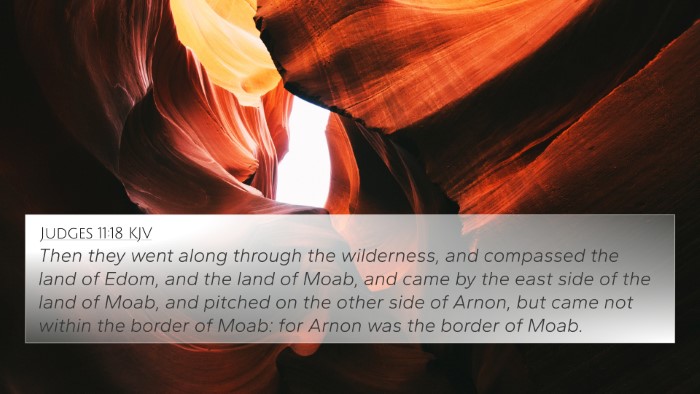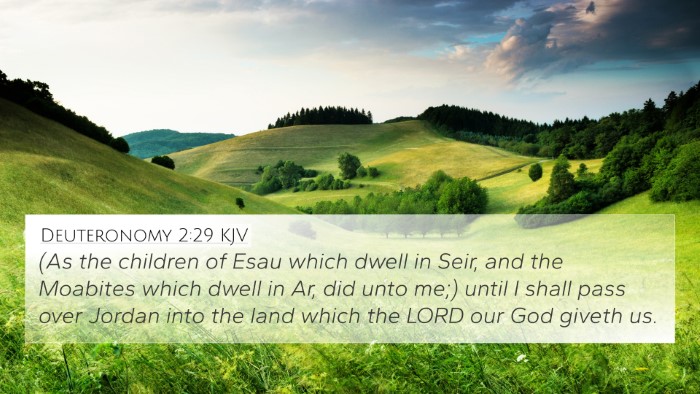Understanding Numbers 20:21
Numbers 20:21 states, "Thus Edom refused to give Israel passage through his territory; so Israel turned away from him."
This verse illustrates a pivotal moment in the journey of the Israelites as they sought to enter the Promised Land. The refusal of Edom to allow passage highlights themes of conflict, the struggle for territory, and the consequences of mutual distrust between nations.
Commentary Insights
Matthew Henry's Commentary
Henry emphasizes the obstinacy of Edom as indicative of a broader theme of enmity. Despite being related by lineage (Edom descends from Esau, Jacob’s brother), Edom’s rejection signifies the underlying tensions that exist even among those with familial ties. This refusal was not merely a denial of passage but a profound statement about national and spiritual relations. Israel's request was made in humility, yet Edom's response was harsh, reflecting their desire to assert independence and strength.
Albert Barnes' Notes
Barnes provides context around the historical relationship between Israel and Edom. The verse indicates Israel's need for cooperation and assistance, which they were denied. The mention of Israel's turning away signifies their recognition of Edom's unwillingness as a moment of strategic withdrawal. This reflects a lesson in diplomacy as well as the consequences of refusing help, bringing about a more significant delay in Israel’s journey.
Adam Clarke's Commentary
Clarke elaborates on the implications of Edom’s refusal. He suggests that this act was not only in opposition to Israel’s request but also a preservation of their identity and territory. Clarke posits that this historical rejection serves as an example of the numerous trials the Israelites faced and the frequent need to adapt their path in the face of adversity. His analysis brings attention to the dynamics of inter-nation relations, particularly how fear and mistrust can shape outcomes.
Cross References and Thematic Connections
To further understand Numbers 20:21, we can explore several related Bible verses and themes:
- Genesis 36:1-5: This passage delineates the genealogy of Edom, providing insight into their lineage and highlighting the historical connection with Israel.
- Exodus 12:37: The context of Israel’s journey through the wilderness, emphasizing their hardships and the necessity of treks through foreign lands.
- Deuteronomy 2:4-6: God's instructions toward the Israelites on how to conduct themselves with Edom, which offers further insight into the expected respect for borders and territories.
- Matthew 10:14: Jesus teaches about rejection, reinforcing the principle that sometimes one must shake off the dust of those who do not welcome them.
- John 1:11: "He came unto his own, and his own received him not" echoes the sentiment of rejection faced by travelers seeking acceptance.
- 2 Corinthians 6:14: Discusses the theme of relationships and connections, underscoring the importance of mutual acceptance, which was lacking in Israel's interaction with Edom.
- Psalms 137:7: Capturing the bitterness of separation and rejection, providing a reflective connection on national identity and feelings of estrangement.
Thematic Reflections and Applications
The refusal of Edom serves as a striking reminder of how societal ties can be strained by fear and misunderstanding. This verse also invites deeper reflection on how communities can either support or hinder one another. Believers are encouraged to consider their role in fostering relationships that promote mutual growth rather than conflict.
Conclusion
In analyzing Numbers 20:21 through various lenses, we understand the complex interplay of relationships in biblical narratives. This verse not only details a historical incident but also serves as a device for broader theological reflections on trust, rejection, and the navigation of community dynamics. By employing effective tools for Bible cross-referencing, readers can appreciate the connections between this and other scriptures, enriching their understanding of the Bible as an interwoven narrative.








